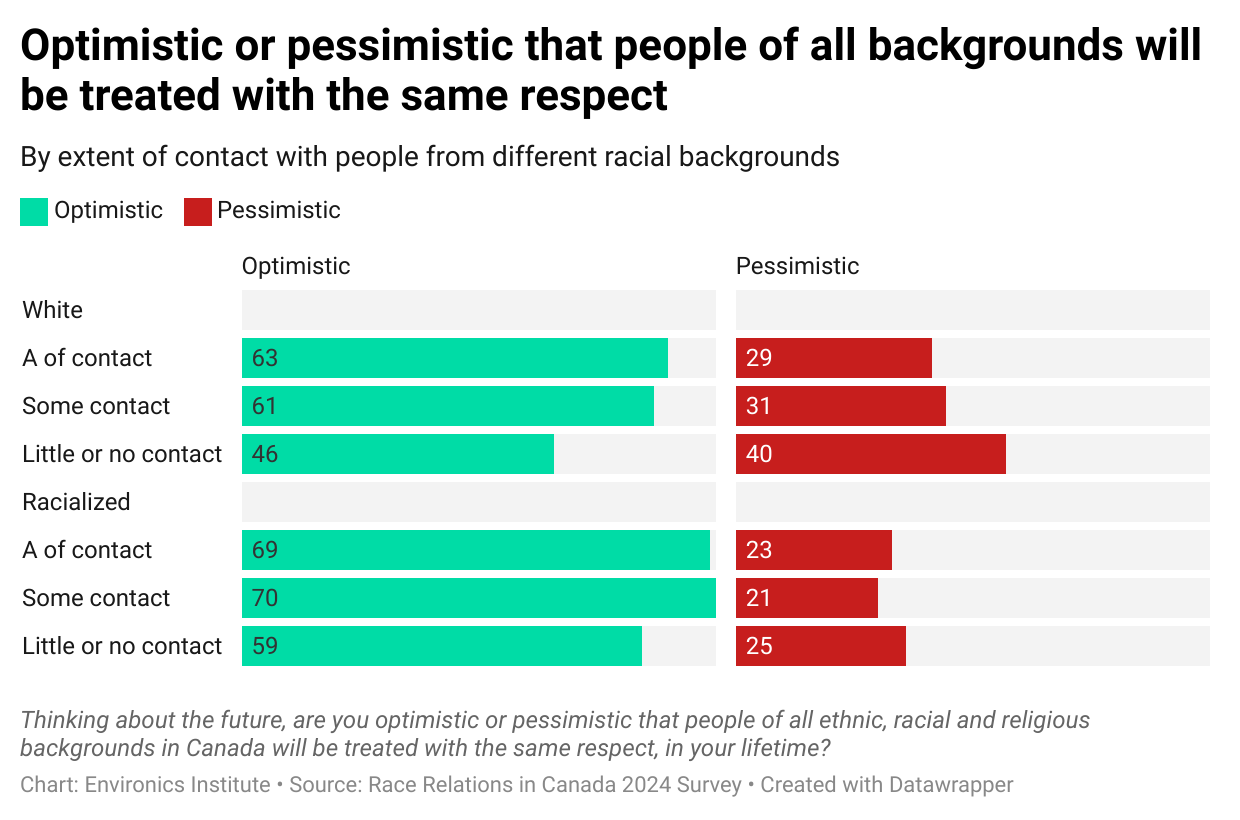Race relations in Canada today: contact and outlook
Do those with more contact with people from different racial or ethnic backgrounds feel better or worse about how we all get along?
As you may have seen, the Environics Institute and the Canadian Race Relations Foundation recently published the results from the Race Relations in Canada 2024 survey. The report covers a lot of ground, and many of the key findings have been featured in our infographic and in news coverage. But there are other topics that deserve to be highlighted. Here, we’ll look at the extent of contact among Canadians from different ethnic or racial backgrounds and how this relates to their outlook on race relations.
The survey asked a representative sample of over 5,000 Canadians: In your daily life, how much contact do you, personally, have with people who have a different ethnic or racial background than your own?
Given the multicultural nature of our country, it comes as no surprise that seven in ten Canadians report having a lot or some contact with people who have a different background. And as we might expect, having a lot of contact is more common for the smaller population of racialized people than for the majority who are white.
Our main interest, however, is to explore whether people with more extensive contact with other racial or ethnic groups feel better or worse about how we all get along. There’s a body of research suggesting that frequent contact with others who are different tends to be associated with more positive opinions about them.1 But is this the case in Canada today?
Our research provides a clear answer, showing that Canadians’ contact with people who are different from themselves is accompanied by a more positive opinion about race relations today and the prospects for a more racially just future.
In the first instance, Canadians with frequent contact with others who are different from themselves are more likely to describe race relations in Canada as generally good than generally bad, in terms of how well people from different races get along with each other. Notably, these results are similar for people who are white and those who are racialized.2
In addition, the more Canadians have contact with people from other racial backgrounds, the more likely they are to express optimism that, in their lifetime, people of all ethnic, racial and religious backgrounds in Canada will be treated with the same respect.3
Again, the patterns are similar, whether one identifies as white or another racial background.4 In this case, however, it is racialized Canadians who are the most optimistic about the future, regardless of how much contact they may have with others who are different from themselves.
What’s also notable is that most Canadians express positive opinions about race relations – even though many have experienced racism in their own lives. The survey confirms that racialized people with a lot or some contact with others from a different background are also somewhat more likely than those with little or no contact to have been discriminated against due to their race or been the target of hate in the past year.
Such negative personal experiences with racism appear to dampen optimism about the state of race relations in Canada, but not to a great extent. People (including racialized people specifically) reporting discrimination or hate directed at themselves are still more than twice as likely to have positive views, rather than negative ones, about different races getting along and the prospect for a future with racial equality.
What we take from these findings is that contact between different racial groups brings out both the good and the bad in Canadian society. For racialized Canadians in particular, it can lead to negative experiences of discrimination and disrespect. But this reality coexists with a greater sense of optimism about the state of race relations in Canada today, as well as prospects for future progress toward racial equality for all.
The race relations survey thus serves to highlight the complexity of experiences in a multicultural society such as Canada, where feelings of disappointment accompany those of hope on a day-to-day basis.
I’m pleased to welcome my colleague Keith Neuman as co-author of this article. Keith preceded me as Executive Director of the Environics Institute and is currently the Institute’s Senior Associate. Keith designed and led all three editions of the Race Relations in Canada Survey, in 2019, 2021 and 2024.
The Race Relations in Canada 2024 Survey was conducted by the Environics Institute for Survey Research in partnership with the Canadian Race Relations Foundation. Full details on methodology are available on the main project page.
What is the Environics Institute for Survey Research? Find out by clicking here.
Follow us on other platforms:
Bluesky: @parkinac.bsky.social
Twitter: @Environics_Inst or @parkinac
Instagram and Threads: environics.institute
Cover photo credit: Harrison Haines
For an example of this type of research based on an earlier edition of the Race Relations in Canada Survey, see the paper on Intercultural Relations and Adaptation in Canada by Environics Institute Fellow John Berry and his colleague Dmitry Grigoryev.
The racialized sample includes people who self-identify by race as other than white – but, for purposes of this analysis, does not include those who identify as Indigenous (this group will be covered separately in other articles). The racialized sample includes significant representation from people who identify as South Asian, Chinese or Black, for whom results can be reported separately (more information on study’s approach, and detailed results for each of the main identity groups, are available on the project website.)
The figures in the bars in the accompanying chart do not add up 100% because the proportions who give no opinion, or who say that Canadians from different background are already treated with respect, are not shown.
Note that these patterns hold for racialized Canadians as a whole, and separately for Canadians who identify with one of the country’s three largest racialized identity groups (South Asian, Chinese or Black).










Needed polling, with overall encouraging and helpful findings.